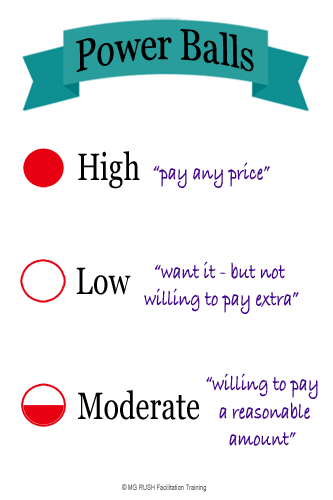The Bookend method (and rhetoric) prevents everything from being the ‘most important’. Effective facilitators shy away from working lists in a habitually linear fashion. Our Bookend method provides a way of squeezing the grey matter towards the middle, rather than wasting too much time on it.
The rationale of our Bookend method and rhetoric
Groups tend to argue about gray areas (“moderate importance”; “pay a reasonable amount”) and frequently the moderate factors have little to no impact on decision quality. For instance, with PowerBalls, you can envision some participants arguing about whether something is more than moderately important but less than highly important. We know from experience that extreme criteria (high and low) drive decision quality, so the Bookend method helps to identify the most important criteria quickly.
When untrained facilitators start in a linear fashion with the first item and ask whether something should be categorized as of high, medium, or low importance, they end up with a list that is 80 percent high. The list becomes less valuable, not more. We should concede that all of the items on the list represent the most important considerations, but that a few items are slightly more or less important than the others. So we can turn to the Bookend method for distributing them equally.
The Bookend Method
After you have compiled a list, compare and contrast different items with the simple Bookend method and rhetoric as explained below:
- Ask, “Which of these is the most important?” (Code the answer with the filled circle PowerBall icon).
- Next ask at the opposite end, “Which of these is the least important?” (Code the answer with the empty circle PowerBall icon)
- Then return to the next most important
- And to the next least important
Return and repeat until the list has been two-thirds scored. Code the remaining one-third as moderate by asking the group, “Will you lose any sleep over making the remaining moderate?”
NOTE: Always ask in the singular: “which is,” not “which are.” When two or more participants speak at once, be prepared to take them all. In advance, divide the list quantity (N) by three. You are seeking three evenly distributed buckets. However, you can be flexible and reestablish balance if forced to add an additional “high,” for example. With 12 criteria, we are seeking three buckets with four per bucket. If forced to add a fifth bucket, we simply offset that with three in one of the other buckets.
If force-ranking, apply the highest available number followed by the lowest available number and repeat until each ranking number has been used
If comparing or contrasting illustrations, consider asking…
- Which is most similar?
- Which is least similar?
Repeat until one-third remains similar.

Power Ball poster available in our Facilitation Store at MGRush.com/shop
For discussions consider asking . . .
- What is your greatest strength?
- What is your greatest weakness?
Repeat until one-third remains as moderate.
NOTE: We do not encourage the use of one-quarter or three-quarter PowerBalls, but remain flexible, if doing so will mitigate an argument and get us back on track. Likewise, we don’t encourage “null,” but you should know what to do if participants say they “will not have” some option.
Five-Level Numeric Alternative (plus Null) Where More is Better
- Low Importance
- Moderately Low Importance (if necessary)
- Moderate Importance
- Moderately High Importance (if necessary)
- High Importance
Ø. NULL or Will NOT have
______
Don’t ruin your career by hosting bad meetings. Sign up for a workshop or send this to someone who should. MGRUSH workshops focus on meeting design and practice. Each person practices tools, methods, and activities every day during the week. Therefore, while some call this immersion, we call it the road to building high-value facilitation skills.
Our workshops also provide a superb way to earn up to 40 SEUs from the Scrum Alliance, 40 CDUs from IIBA, 40 Continuous Learning Points (CLPs) based on Federal Acquisition Certification Continuous Professional Learning Requirements using Training and Education activities, 40 Professional Development Units (PDUs) from SAVE International, as well as 4.0 CEUs for other professions. (See workshop and Reference Manual descriptions for details.)
Want a free 10-minute break timer? Sign up for our once-monthly newsletter HERE and receive a timer along with four other of our favorite facilitation tools, free.

Terrence Metz, MBA, CSM, CSPF, PSP01, HTTO1, is the Managing Director of MG RUSH Facilitation Leadership, Training, and Meeting Design, an acknowledged leader in structured facilitation training, and author of “Meetings That Get Results – A Facilitator’s Guide to Building Better Meetings.” His FAST Facilitation Best Practices blog features nearly 300 articles on facilitation skills and tools aimed at helping others lead meetings that produce clear and actionable results. His clients include Agilists, Scrum teams, program and project managers, senior officers, and the business analyst community among numerous private and public companies and global corporations. As an undergraduate of Northwestern University (Evanston, IL) and an MBA graduate from NWU’s Kellogg School of Management, his professional experience has focused on process improvement and product development. He continually aspires to make it easier for others to succeed.


